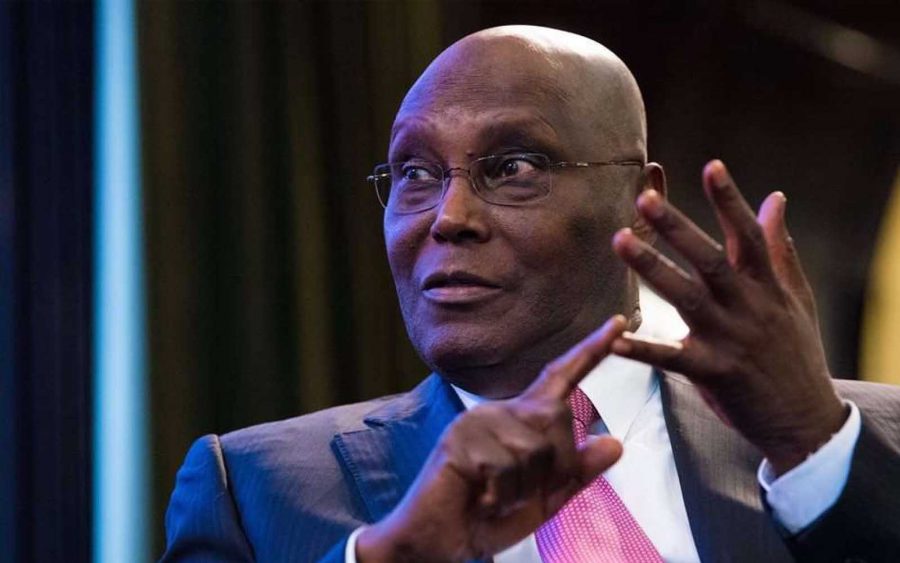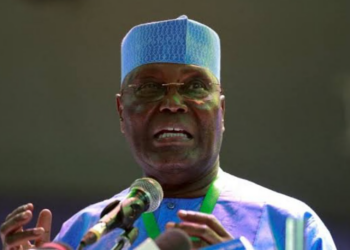Presidential candidate of the People’s Democratic Party (PDP), and former vice president of Nigeria, Atiku Abubakar, has unveiled sure-fire solutions to Nigeria’s economic challenges in his manifesto, aptly titled, Pathway To Recovery.” In that document, which proposes solutions to what is arguably Nigeria’s niggly challenges of economic growth, security, restructuring, and unity, he reveals that beyond economic growth, a well-meaning government should target how that growth can have a trickle-down effect on the people.
The Trickle-down effect was actively pursued in the 1980s during the administration of Ronald Regan as president of the United States and championed by Economist Arthur Laffer of the famous Laffer Curve. The idea, though, gained traction in the 1960s, when Welfare Economics was mainstreamed by development economists. An advocate of Welfare Economics, Amartya Kumar Sen, won the Nobel Prize for Economics in 1998.
So, toeing the line of welfare economists, Atiku proposes to end Nigeria’s systemic economic challenges from a position of experience by ‘learning from the mistakes of the past, consolidating on the successes of previous regimes and building the future by an unwavering commitment to the principles of open, competitive and private sector driven economy.’ Atiku is also committed to building institutions to drive this economic renewal.
In his Manifesto, Atiku identified the challenges and provides the solutions: He tackled the issue of job creation and entrepreneurship, poverty alleviation, and economic empowerment.
Job Creation and Entrepreneurship Development
Prognosis
The document noted that: Close to 16 million people are unemployed, over 2 million new entrants join the labor force each year. Unemployment for women and young people is at 33%, and 70% of unemployed youths are uneducated and unskilled.
Proposed Solution
- Jobs creation
- Atiku will launch a new, more efficient, cost-effective, and sustainable national Entrepreneurship Development and Job Creation Program. How will he do that? He will target the creation of up to 3 million self- and wage-paying employment opportunities in the private sector annually; target all categories of youth, including graduates, early school leavers, and the massive numbers of uneducated youth who are currently not in schools, employment, or training.
- The proposal also includes the creation of incubation centers, clusters, and industrial/commercial hubs to provide a marketplace for MSMEs and SMPs, as well as championing the repositioning and streamlining of the activities of the existing federal and state government job creation agencies.
- Atiku recognizes too, that the informal sector is a pathway to a treasure trove of jobs. So, plans to take advantage of that understanding by re-launching the National Open Apprenticeship Program (NOAP) with a special focus on youth who may not have had the opportunity to attend a school or complete basic education. This program will recruit, annually, 100,000 Master Crafts Persons (MCPs) who will train 1,000,000 apprentices in various trades.
- In addition to the above, he will open up a vista through the SCHOOL TO JOBS PATHWAY. This will come on stream by supporting the formal TVET system and re-position the technical colleges and vocational skills acquisition centers to produce skills and competencies for innovation and the creation of new ideas and products inside enterprises from where future jobs and prosperity will be delivered.
- Entrepreneurship Pathway
- Nigerians are heavy on entrepreneurship, but research shows that a good percentage of businesses die within five years. It becomes expedient to encourage and nurture entrepreneurs.
- To that end, Atiku will encourage institutional frameworks that will ensure grants, loans, or equity investments in small enterprises either as start-up capital or to scale up innovations; introduce, and actively promote, a Graduate Trainee Program (GTI); improve the technical and financial capacity of the Industrial Training Fund (ITF).
- MSME /ICT Special Entrepreneurship Pathway
- The Atiku government will prioritize support to the MSMEs across all the economic sectors, facilitate the establishment of the SME Venture Capital Fund by the private sector; provide special focus on the ICT sector and aggressively market Nigeria as an outsourcing destination and, actively promote “Nollywood” and “Kannywood”.
- Poverty Alleviation and Economic Empowerment
- The manifesto aptly recognizes that Nigeria is rated as one of the poorest and most unequal countries in the world, with more than 80 million of the country’s 190 million, or more than 40% of the population living below the poverty line. Nigeria has overtaken India as the country with the largest number of people living in extreme poverty, with an estimated 87 million, or about 50% of the population. The intensity of poverty varies from 38% (SW and SE) to 45% (NW).
- Unless we act fast, Atiku cautions, Nigeria, together with the Democratic Republic of Congo will be home to 40% of the world’s extremely poor people.
- The solution is beyond direct cash distribution as the present administration is doing but by providing skill acquisition opportunities and enterprise development for job and wealth creation, improving citizens’ access to basic infrastructure services – water, sanitation, power, education, and health care; removing all forms of discrimination against the marginalized and vulnerable citizens and enhance their access to education and income generating activities.
- Part of the solution is also by implementing pro-poor policies that will enhance their participation in economic activities and improve household income and by working more closely with NGOs, the private sector, and other development partners to mobilize resources for the effective implementation of our empowerment strategy.
- But what is entrepreneurship without an enabling environment that will guarantee a good transportation system and steady power infrastructure? Atiku proposes to tackle these perennial issues militating against businesses in Nigeria.
- The Transportation Problem
- Atiku observes that over 90% of freight and passengers are moved by road. And that both the 2005 National Transport Policy (NTP) and 2010 draft National Transport Policy were never considered or adopted due, largely, to poor commitment and lack of capacity. Too many policymakers and regulators – four different ministries: (Ministries of Transport; Aviation; Works; and Agriculture and Rural Development).
- To remedy the situation, Atiku proposes legislation, framework, and regulation overhaul, developing 5,000km of roads by 2025 through PPPs and community interventions, developing and rehabilitating the connecting road networks across the geopolitical zones, encouraging transportation development around the nation’s agricultural and industrial clusters; constructing up to 5,000km of modern railways through privatization, PPPs and public investments and, improving existing port efficiency and achieve accelerated development of alternative container ports, especially inland dry ports.
- The Power Problem
- Atiku’s document points out that pre-privatization in 2013, for decades, no new generation plants, whether thermal or hydro, were built in Nigeria; post-Privatization to 2018, the power sector has not delivered the promises of development envisaged by the reform program; electricity supply has not improved, yet the average wholesale cost of electricity generation has gone up by over 120% since 2015. The majority of the sector players are in financial distress; generation capacity is above 11,000MW but actual production consistently averages below 4,000MW and that transmission remains the weak link with 5,000MW capacity untested.
- The solution for the poor power situation would be, that he would allow NERC to perform its regulatory functions without interference and guarantee its independence; review the Aggregated Technical, Commercial, and Collection (ATC&C) losses existing in the power networks and extract firm commitments for a revised ATC&C loss reduction target from the distribution companies; create an environment that would enable distribution companies to recover full costs for power supplied to their consumers; introduce creative solutions towards addressing the huge debt overhang and liquidity challenges in the power industry; ensure enforceability of industry contracts and, upgrade the transmission grid.

























